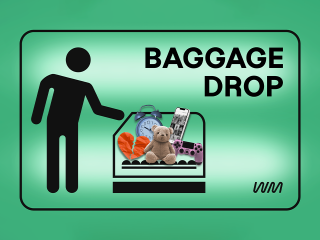
Ryan Howes, PhD
Clinical psychologist and writer in Pasadena, California, working primarily with men from a psychodynamic/relational approach
Week two of Wondermind's Baggage Drop begins with host clinical psychologist Ryan Howes, PhD, exploring our many types of support. Recognizing our external “yeses'' and working on inner support both turn out to be crucial for long-term success. Dr. Howes then guides us to harness inner support by following a series of prompts about those you admire.
Download the How to Find Your Support System worksheet!
Learn more about Dr. Howes
Check out Dr. Howes’s “Mental Health Journal for Men” workbook
As a performance brand for over 70 years, the ASICS philosophy mixes human-centric science with charitable partnerships, and the belief that mind and body are linked…so working on both fuels your power to uplift yourself, and other people. Nothing’s more powerful than mental health.
So after this podcast’s mental boost, learn how ASICS can bring that ethos to your life by heading to asics.com. ASICS—sound mind, sound body.
(BAGGAGE DROP THEME BEGINS)
RYAN HOWES, PHD, HOST: Hey there, I’m Dr. Ryan Howes, clinical psychologist and Wondermind Advisory Committee member. Welcome to week two of Baggage Drop! This week, I’ll tell you more about the techniques and mindset adjustments that you started last week. We’ll also get into the types of support you’ll need to maintain changes you are making. Our team at Wondermind created Baggage Drop to give you tools to make meaningful changes in your daily life. We want to help you get rid of whatever’s weighing your mind down, so you can reach higher heights with your mental health. This is Baggage Drop.
(MUSIC BEGINS)
DR. HOWES: If this is your first Baggage Drop episode–awesome. We can start together. But I encourage listeners to circle back to last week’s episodes–you might get even more out of this one. This week is all about recognizing and remembering to lean on your support systems. So, together, you and I, let’s get into it!
In week one, we learned that “Baggage” can be anything that weighs you down or holds you back. This week, we’re also going to look at ways that weight can be lifted when it’s shared, and when you’re supported. Significant research has proven that social support can greatly benefit one’s quality of life—and according to researchers at the University of Pennsylvania, there are four categories of support: there’s emotional support—that’s the one your friends and family typically provide when they give you a pep talk. There’s instrumental support—that’s tangible services, like when your spouse does the laundry. There’s informational support—like advice, suggestions, or news. And there’s appraisal support—this one’s when someone’s perspective helps you learn more about yourself or your situation.
And even though that sounds like a lot, we’re here to help you find ways to recognize and use even a small fraction of your support system. First, we wanna get a handle on where your support comes from. So think on this:
Who is the first person you want to tell when you have good news and bad news?
We asked our community these questions – and here’s what they told us.
(MUSIC BEGINS)
[VOICE CLIP 1]: The first person I tell good or bad news to is my sister. She’s my youngest sister and growing up we were always fighting and everything, but now that we’re both adults, we’re super close, so anytime I get any news about anything, good or bad, she’s always the first person I go to.
[VOICE CLIP 2]: My mother, for sure, my family, my sister, my partner.
[VOICE CLIP 3]: I would say the bad news…it would be my mom I guess. And the good news that would be a friend that I met when I was studying in the National Academy of Dramatic Arts. It was my second year, and since then, that person changed my life in so many ways.
[VOICE CLIP 4]: So the first person I tell good news would absolutely be my dad. He’s incredible, like, thinking about him just brings tears to my eyes because I’m so incredibly grateful he’s so supportive. He’s my “why” so he’s the reason why I try at everything…like I can’t even describe in words how grateful I am for him. I do tell him bad news too, because he’s the one that’s in my corner rooting for me.
[VOICE CLIP 5]: So the first person I share good news with is my little brother because he’s always genuinely excited for my news, and if I have bad news it’s mostly my best friend because she just understands it.
[VOICE CLIP 6]: Speaking of the person I would share both my good news and my bad news is my best friend and my brother. He’s my best friend and is actually my brother. We think we share that as brothers, so he’s a very very special person to me, so I will share every news with him.
[VOICE CLIP 7]: My dog is my therapist, so she knows everything about me even before I do so, yes, my dog knows everything.
(MUSIC BEGINS)
DR. HOWES: Some people call these people who come to mind their “yeses” or their “stakeholders.” I like to call them my buddies. And it’s important to note that your “yeses” can come directly from people, but they also can be found elsewhere. A cuddle from a pet. A song that puts a new pep in your step. New flowers in your garden. Support doesn’t have to be big or life-altering. But sometimes, we go through periods in our life when we may not have something or someone who comes to mind when we think of support. Contrary to popular belief, that’s not a problem.
I want you to remember, you always can find support from within. I know that sounds a bit dark. But it’s actually really important to ensure you always are your own support. That’ll keep you going through the toughest of times. In fact, sometimes inner support helps us notice how we can uncover “yeses” even when we didn’t know they were there. For a little inspiration, here’s where some of the Wondermind community said they found their yeses:
[VOICE CLIP 8]: I got a big “yes” from the world today when my puppy woke me up with a big kiss and a hug.
[VOICE CLIP 9]: A time I got a yes from the universe was when I was on a mental health walk and I was really in my head about all the things going on in my life at that time, and I looked up, and the entire woods in front of me was just filled with fireflies and I immediately felt calm and safe and grounded.
[VOICE CLIP 10]: So I have been on a job hunt for a new job for the last five months. I’ve had multiple rejections with over 50 applications and finally last week I had just kind of enough of my current job situation. I was just so frustrated, and that same week days later, I got my first job offer and it was for a job that I have wanted so badly and was at the top of my list. And then today, a week later, I got another job offer from another job offer from a place I would love to work so I would definitely take that as a definite smile.
[VOICE CLIP 11]: So this past Sunday I was on a walk with my mom and it was a cloudy day and I was just feeling really down and really hurt because I had found out that one of my exes is dating one of my friends. So I was finishing my walk, I turned, and I saw a beautiful double rainbow form in the sky. And I took that as a sign from the universe that my future is bright. My future holds a lot more love, and my future holds people that are going to love and respect me for who I am and are going to reciprocate everything I give out.
(MUSIC BEGINS)
DR. HOWES: To begin your work of harnessing inner support, let’s start here:
Who’s your role model or hero?
Why do you like them?
What do you admire about them?
Can you incorporate any of what you think makes them great into your own choices or daily movements?
Here’s a story that hopefully can demonstrate why I’m asking these questions:
I recently had a conflict with a colleague that really bothered me—I was losing sleep at night trying to find a solution. But I remembered I had a friend who went through a similar situation a couple years ago. He handled it with bravery, poise, and grace as he boldly asserted himself.
“I want to be like him,” I thought. Having him as an example helped me be my best self as I made significant choices in my own life. I think this exercise can help you identify qualities that you admire in others, and help you incorporate these qualities in your own life. Because we all have people to lean on, but sometimes our best support is ourselves. Remember, this is a practice. Remember to be receptive too. It is a learning process, and it is important to have compassion for yourself when it gets hard. Keep at it! And with time you might look at yourself in the mirror and realize—“Hey, my biggest support does everything with me because it is me!”
(BAGGAGE DROP THEME BEGINS)
Did you enjoy this episode? Maybe learn something new?
Leave Wondermind a quick voicemail at the link in our show notes, and tell us what new habit you’ll be starting this month or share a story about finding your own surprise support. Your contribution might even get featured on our Friday recap! Thanks for joining me today!
Tune back in on Wednesday for our next installment of Baggage Drop!
Credits:
Senior Producer: Marisa Bramwell
Senior Writer: Amy Thompson
Producer: Jennifer Bassett
Producer: Pia Glenn
Audio Engineer: Joel Edinberg
Music: Epidemic Sound
Wondermind does not provide medical advice, diagnoses, or treatment. Any information published on this website orby this brand is not intended as a replacement for medical advice or a substitute for the advice of a professional, and you should not rely on it. Always consult a qualified health or mental health professional with any questions or concerns about your mental health




